Dementia
Who Wipes Who? Life After Depends
The stigma of Alzheimer's and the joys still to come.
Posted February 8, 2016
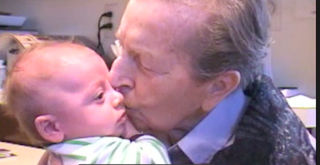
I’ve often heard people say, “If I ever get to the point where someone else has to wipe my butt, it’s all over; shoot me.”
The value of an entire lifetime is reduced to this one, necessary physiological activity of daily life. Particularly in our American culture, it somehow represents a final humiliation that makes continuing to live simply not worthwhile.
Or does it?
It was quite eye-opening to hear noted death and dying activist Stephen Jenkinson speak of other cultures and tribes wherein the natural cycle of life is more accepted and integrated into the customs of the group. There really are places where cleaning and changing our elders is no more significant or humiliating than when they did the same for us as infants. The circle simply comes round, and the change in roles is treated with grace and dignity. It is not necessarily a gloomy harbinger that the end is near, and it certainly is not some Divine signal to call it quits and end one’s life prematurely.
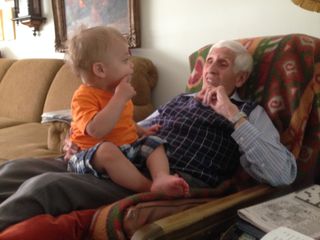
For there are clearly lots of “quality-of-life” moments that continue to occur daily for the wipees, outside the bathroom! Holding and kissing one’s grandchildren, or in my parents' case, their great-grandchildren, is but one wonderful example. There are still songs to be sung, laughter to be shared, quiet moments of wordless, shared time and space. A goodnight kiss or caress. A walk or a wheelchair ride around the pond.
Ironically, when that dreaded transition time of personal hygiene occurs, it is often the caregivers that are more disturbed, particularly if their loved one has dementia and can often be somewhat oblivious to the new wiping regime. Yet despite the millions of people who are already suffering, or soon-to-be suffering, from the Alzheimer’s epidemic or another memory-related disease, there remains an inappropriate stigma attached to not only the wiping factor in particular, but to the very disease itself, especially in my parents’ generation.
My brother and I, for example, had to painfully stand by as our father went to great lengths to conceal our mother’s growing condition from the world, futilely trying to “cover” for her, although it was actually completely obvious to anyone who knew her or were even meeting her for the first time. One day Mom came across a photo of her next door neighbor from her childhood in Germany. She was so excited to see her again that she ran next door—in Fair Lawn, New Jersey, 50 years later—to show her the picture, my father chasing after her to avoid the embarrassment.
My Dad’s resistance to acknowledging her condition to himself, let alone the neighbors, was such that long after Mom became incontinent and special undergarments were clearly in order, Dad would still take her out in public, to restaurants and malls, always carrying extra underwear and pants with him in the event of an accident. He somehow preferred the cumbersome and stressful difficulty of changing her in a public restroom to accepting the fact that his beloved wife of over 60 years needed to wear a diaper.
I understand it now. I was impatient with him at the time for not seeing the obvious.
Another of Dad’s hard-fought lessons about dementia care: The oft-told first instruction of “Caregiving 101” for Alzheimer’s is to “go with the patient’s reality, don’t try to correct them." Yet no amount of explaining that idea to my father—who would nod his head in agreement and seem to grasp it—would prevent his knee-jerk reactions, often losing his temper with Mom when she would, for one example, insist that she didn’t have a sister only five minutes after her sister had visited.
“OF COURSE YOU HAVE A SISTER!” Dad shouted, completely flustered, “SHE WAS JUST HERE!”
After one such outburst, my mother actually took me aside and whispered, “I think there’s something wrong with your father; he has been acting very crazy lately.” I burst out laughing, because in a way, it was true; who really was the crazy one in that scenario? Mom’s version of reality made perfect sense in her experience; it simply wasn't useful to try to convince her of "real reality.” (Whatever that is!)
The progression of my mother’s decline was gradual, but within a few years it was no longer possible for my father to deny or hide her condition. Yet as Dad finally faced the deep grief of losing the partner he knew and loved so well, I couldn't help but notice that there were times when he also gradually seemed to appreciate and enjoy the brand new partner that was taking her place.
I know for sure that I did.
For Alzheimer’s dramatically transformed my mother's personality, mostly in very positive ways. I’m well aware that this is not always the case for people, and it wasn’t even always the case with Mom. She went through a very difficult, aggressive period of chasing people with steak knives, screaming at herself in the mirror, fighting her aides, kicking and screaming and pulling their hair. Thankfully, ten days in a psychiatric ward was sufficient to find a medicine that worked to curb the violence while not overly sedating her, and it has been pretty smooth sailing ever since.
Apart from that brief period, generally speaking, my mother slowly evolved in what I perceived to be a positive direction, all things considered. I had always known her to be a rather proper, cautious, critical and fearful person who had survived the trauma of narrowly escaping the Holocaust and losing her grandmother in the process. She experienced many horrors first-hand as a child. She was smacked and humiliated in front of her classroom, forced to read aloud passages from Der Sturmer that compared Jews to vermin. She endured the terrifying night the Nazi’s broke down the front door of her house with an axe. On and on.
Mom arrived in America as a traumatized teenager, speaking very little English, and would be haunted for the rest of her life by memories and images of Nazi Germany. She was unable to watch any depiction of the Holocaust on television or in movies—forget about Schindler’s List!—without growing visibly disturbed and panicky.
If she were stopped in her car by local police, she had great difficulty, unconsciously, in distinguishing the uniformed local young men from Hitler's SS, and her heart would pound in terror. As a result, she moved very cautiously through life, keeping the “other” at arm’s length, and instilling in us, her children, that same caution. The message was that the world was an extremely dangerous place for Jews—for us—and unfortunately much of the time that message still colors my experience of life to this day. (Meaning, I still generally prefer to stay home; even better, in my pajamas.)
The gift of Alzheimer’s was that my mother gradually shed those awful memories along with the emotional layers of protection they gave rise to, and she slowly blossomed into one of the sweetest, most loving, open, joyful and even angelic people you could ever hope to meet, beaming a radiance and love to everyone she encountered. She became very childlike, restored to an essential innocence within her that was clearly pre-Hitler, when the world was still safe, filled with beauty and possibility. I began to recognize and know that young, undamaged, beautiful little girl she had once been, and that I had never seen or known before.

Along with her aides and many others, I fell in love with her.
Which was a great relief and blessing, after fighting and struggling against her fearful world-view for my entire adult life. Finally my heart relaxed and opened to my mother in appreciation and gratitude, and I at last recognized the love that had always been within her for me, and felt that I was finally reciprocating. And thankfully, this transformation occurred while she was still relatively herself, so it was a shared experience; it registered. So although I knew it wasn’t really the “right” thing to think, I was nevertheless secretly grateful to Alzheimer’s, and to Mom's longevity, for I felt that it had allowed for the healing of our relationship that I had vainly struggled to resolve for years in endless hours of fruitless therapy sessions. (Mom, by the way, is still with us, 16 years later!)
The changes in her personality were clearly a blessing within a curse. Amidst the tragedy and gloom—particularly for Dad, but for all of us—that pervaded my mother’s gradual progression through the stages of Alzheimer’s, her process also brought me, and at times the rest of the family, many years of joy and laughter. It was as if she had truly come alive at last, and the essence of who she really was—buried deep beneath her previously fearful persona—finally shined forth in a way I had never seen—or had been incapable of seeing, perhaps—throughout my adult life. A few moments:
● One day she was laughing and spontaneously turned to my brother and said, “I love you!” That had definitely not been her style as a mother in our childhood. My brother turned to me and said, “Wow, I wish I had grown up with this woman!”
● She always kept our home in a state of pristine cleanliness, devoting her life to housework and family. Thus I was delighted one evening after dinner several years ago as I observed her carefully sweeping up all the crumbs on the table into a small pile, brushing them into her hand, then mischievously looking over her shoulder to see if my father was watching, and then threw them on the floor, laughing and happy as could be!
● Once our family was exiting a restaurant, thinking Mom was right behind us, but she wasn’t. We looked back in through the restaurant’s front window and observed with astonishment my mother slowly working her way toward the front door, stopping to chat at each table with the patrons. This was the person I knew to be at best polite to “strangers,” but generally to avoid them whenever possible.
Fast forward a few years, and now, alas, the cycle is turning again. Both of my parents are 92. Both are still living at home, and both were completely oblivious of their recent 69th anniversary. Sometimes Dad gets confused about “who that woman is, the person in the other bed.” Or refers to her as his mother. Just this morning he asked me to remind him what his own name was, and to confirm that he is still alive. Yet a moment later he can also still surprise us with statements of near-lucidity.
Remarkably, until just two years ago, my Dad was independently managing my mother’s at-home care and running the household; driving, shopping, cooking, scheduling aides and doctor’s appointments, paying the bills.
My brother and I grew concerned about his driving when I called him one day, and he answered from the car. I could hear him fumbling with his cell phone, and he said,
“Hold on a second, El.”
In the background I heard him calling out to someone else:
“What’s that? Oh, okay, thank you!”
“Who was that, Dad?”
“Oh it was nothing, just a pedestrian, telling me I was driving on the sidewalk.”

Oh, I thought, it was nothing. Not long after, he drove up a curb, across a sidewalk, and stopped just short of a plate-glass window in front of a kosher deli. Had he gone two feet further, an elderly couple enjoying their corned beef on rye would have had a rude interruption to their lunch. His immediate reaction was to comment, “I have to get these brakes checked.”
But in fact, he had had a stroke; the problem was with his leg, not his brakes. Yet seemingly indestructible, after less than a month of physical therapy, he was, to our horror, back behind the wheel, a menace to pedestrians and other drivers, and resumed his life as full-time caregiver for Mom. (Taking away his car keys was simply not an option yet; we were cowards in the face of his wrath over the issue. Thankfully, he only managed to run into mailboxes, never children. Or adults.)
Several months later, while brushing his teeth one night, the bathroom mat slipped out from under him, and he fell flat on his back. (Yes, the aides had warned him that the mat was slippery and removed it every morning; and yes, he indignantly replaced it every night.) Rather than press the Life Alert button dangling around his neck that was only there for moments precisely like that one, he opted instead to lie there for several hours, and then somehow managed to crawl back into bed.
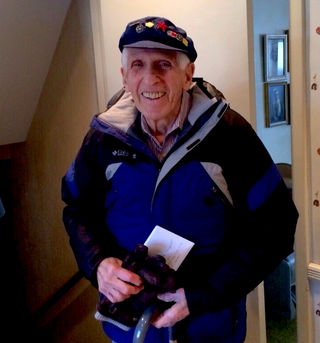
As it turned out, he had fractured his spine, but miraculously, once again it was nothing that a little physical therapy and wearing a back brace couldn’t fix, and roughly six weeks later, Dad was fully recovered, driving again (God help us) and we gratefully celebrated his 90th birthday.
Sadly, only six days later, on my parents’ 67th anniversary, Dad tried to carry an assortment of loose groceries up the stairs without holding onto the banister, despite our warning him dozens of times to always hold on, having frequently witnessed him precariously teetering up the stairs, wildly out of control, even with his hand on the banister, the other often balancing a shaky cup of coffee.
Although the groceries somehow made it up to the kitchen, Dad did not, and went plummeting down the steps, landing on his head, unconscious, and suffering a near-fatal, Traumatic Brain Injury. (Although remarkably, the half-gallon carton of orange juice he was still clutching emerged without a scratch.)
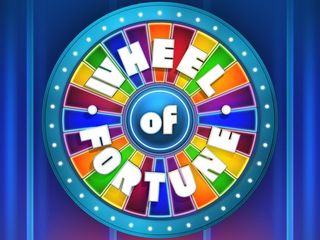
Thus began the turn of the great Wheel of Fortune.
Literally overnight, we had two helpless elders to care for, and my wife Shari and I moved in, and I found myself, at 61, sleeping in the bed and room I had slept in at the age of five.
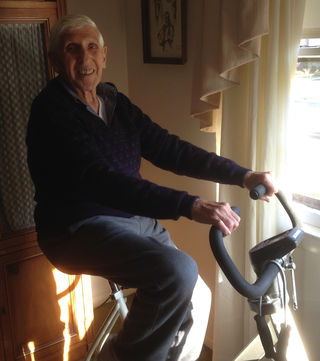
Over time, however, Dad once again defied the odds, and although a doctor had advised us to call Hospice and to begin saying our good-byes, about a year later I sent that doctor a video of my father vigorously riding an exercise bicycle, waving to the physician, saying, “Ask him how he is!”
Now another year has passed, and after suffering a major seizure last spring that left him non-responsive and filled with tubes for several days in the I.C.U., the collective impact of all his traumas finally took their toll, and we witnessed my father’s rather rapid decline into confusion, memory loss and increasing dementia.
And yes, I found myself helping him in the bathroom putting his incontinence garments on; and yes, I encountered the perennial “who-wipes-who?” question that I began this piece with. I found that it is a very intimate act, on the one hand, and certainly presented me with an inner barrier I needed to move through. On the other hand, I noticed, as Jenkinson points out, it’s not truly that big a deal, just what has to be done.
And there definitely does remain a life to be lived outside of the bathroom. Each night after dinner, when Shari and I are there, we play YouTube clips of Sinatra singing, Gene Kelly dancing, scenes from Fiddler on the Roof and so forth, and Dad usually knows most of the lyrics and sings along. The other night he correctly identified the guy on stage with Sinatra as Sammy Davis. With aides holding onto him, and him holding onto his walker, he has been known to participate in riotous conga lines on celebratory occasions. And with very little provocation, we can get him singing “The Flat Floot Floogie” or “Tootie Fruitie,” two old favorites. And of course, his old Army song:
“Well the donuts that they serve us, they say are mighty fine,
One rolled off the table, and killed a friend of mine.
Oh how I hate this army life:
Gee Ma, I wanna go,
Gee Ma, I wanna go,
Gee Ma, I wanna go home!”
As Dad’s hearing gets worse, we accidentally discovered that, for whatever reason, he seems to hear us much better if we speak with an Italian accent. The other night I said the Yiddish phrase, “Oy gevalt,” and he didn’t understand me, so I added an Italian dialect: “Oy-a gevalt-a!”
Dad didn’t miss a beat:
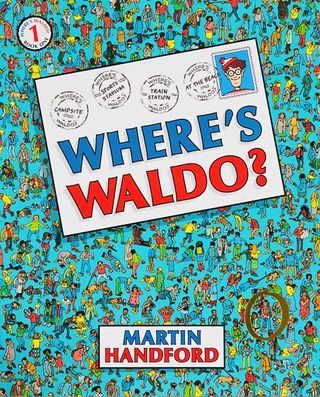
“Yes, where is Valta? I am looking for him too.”
Virtually every time I call out to my wife—“Shar?”—he invariably hears it as “Dad,” and will respond, “What?” I grew tired of explaining I wasn’t calling him, so decided I needed a new nickname for Shari, to differentiate her, and I opted for “Peaches.”
But I was no match for Dad, his wit still intact beneath ever-varying degrees of dementia. I tried out the new name, calling, “Peaches?” and my father instantly answered,
“Yes, darling?”
I have consistently found that there are always layers of joy and laughter folded into the poignancy and sorrow associated with losing a loved one to dementia. As my mother “disappeared,” friends would often ask me nervously, with a look of tragic expectation on their faces, “But does she still know who you are?” They were obviously convinced that that was the most important and most unbearable part of the equation. But I would usually think to myself, “Well truth be told, I still don’t really know who I am, so why would I care if she does?”
What I did, and do care about, always, from the start, is an intuitive sense of connection. After 16 years, my mother is now long past any sort of language, at best quietly mumbling some gibberish sounds when she wants to communicate, which is rare. Mostly, she seems content to be deeply removed from her immediate surroundings, though often appearing to be quite alert, sometimes staring at the television. To make contact, I have to circle around her eyes, like an airplane looking for a place to land, until I find that singular spot where her pupils are focused, and I come into her view.
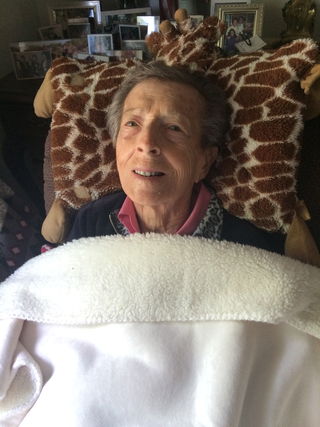
Even then, she may or may not register my presence. But there’s at least a 50-50 chance that she will notice someone is standing there—another human gazing at her—possibly even, one can only conjecture, someone she recognizes on some level, triggering a long-lost, distant, faded memory buried deeply in her subconscious.
Or possibly there is no such recognition at all anymore. I truly don’t know, although her aides used to assure me that I received a bigger smile than anyone else. I’ll take that. But regardless, what there is, is a sudden rushing of consciousness and aliveness into Mom’s face when she eventually notices I am there in front of her, and she will break into a broad and warm smile, and often try to say a few words, or even laugh with delight. And then just as rapidly turn away and forget I am there, and retreat back inside her world.
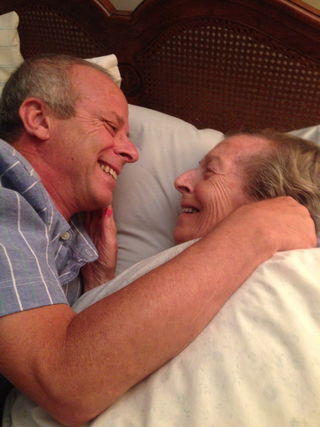
But that single, fleeting moment of connection, soul to soul, within the vast mystery of being and relationship, is always enough for me.
Unlike my mother who mostly slipped away from consensual reality into her Alzheimer’s world without consciously noticing or being upset about it, my father is in the unenviable position of still retaining just enough self-awareness to recognize that he is losing or has already lost many of his physical and mental capacities. So he can often be quite morose, withdrawn, depressed, confused and frustrated. Prozac didn’t help. But as I said, in the right conditions, with the right people around, he can be cajoled into life, and will sing, joke, dance and laugh. I can only pray that he has more of those moments, and fewer of the former.
Who wipes who? That's truly the least of it.
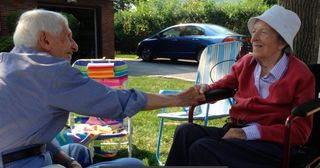
Eliezer Sobel is the author of Blue Sky, White Clouds: A Book for Memory-Challenged Adults, one of the only books available for the dementia patient, among some 20,000 titles for the caregiver. See blueskywhiteclouds.com




